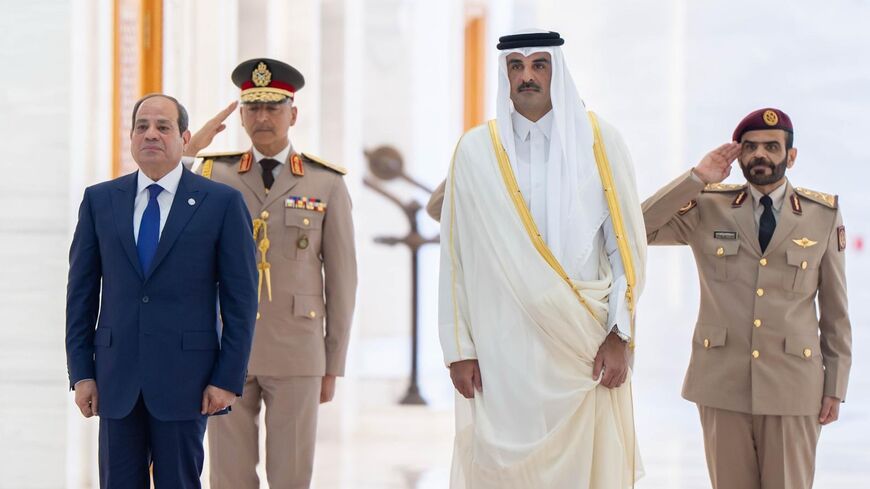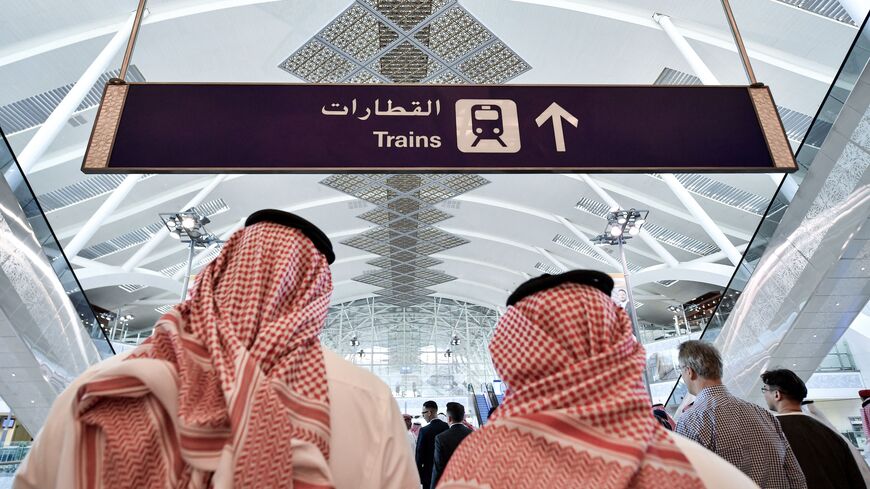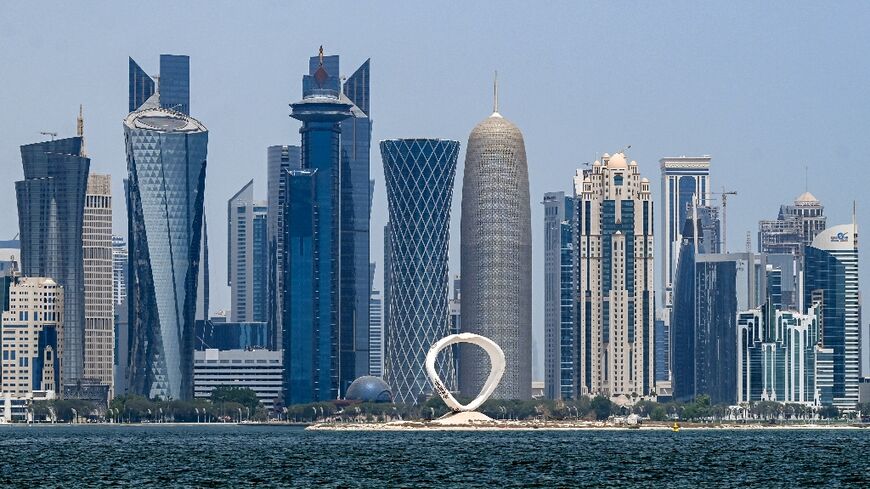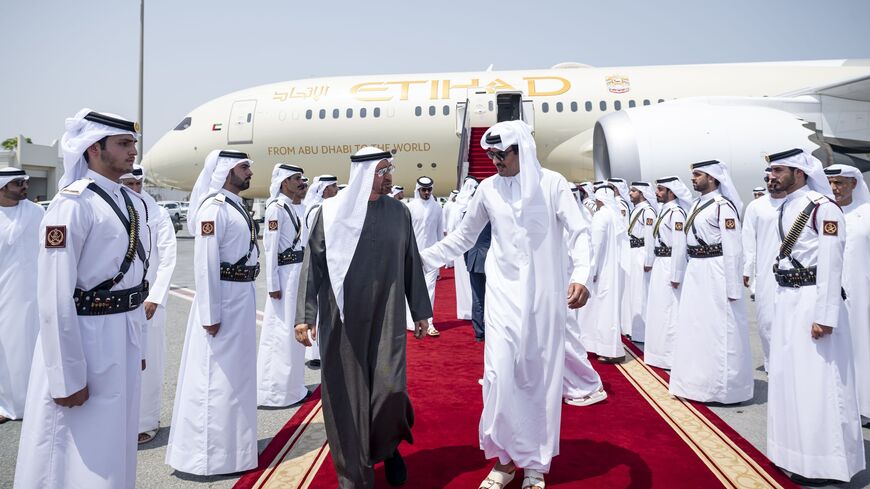Arab, Islamic leaders urge 'review' of Israel ties at emergency summit after Doha strikes
The meeting comes less than a week after Israel launched airstrikes targeting Hamas’ leadership in Doha, a move Gulf states say poses a serious threat to regional security.
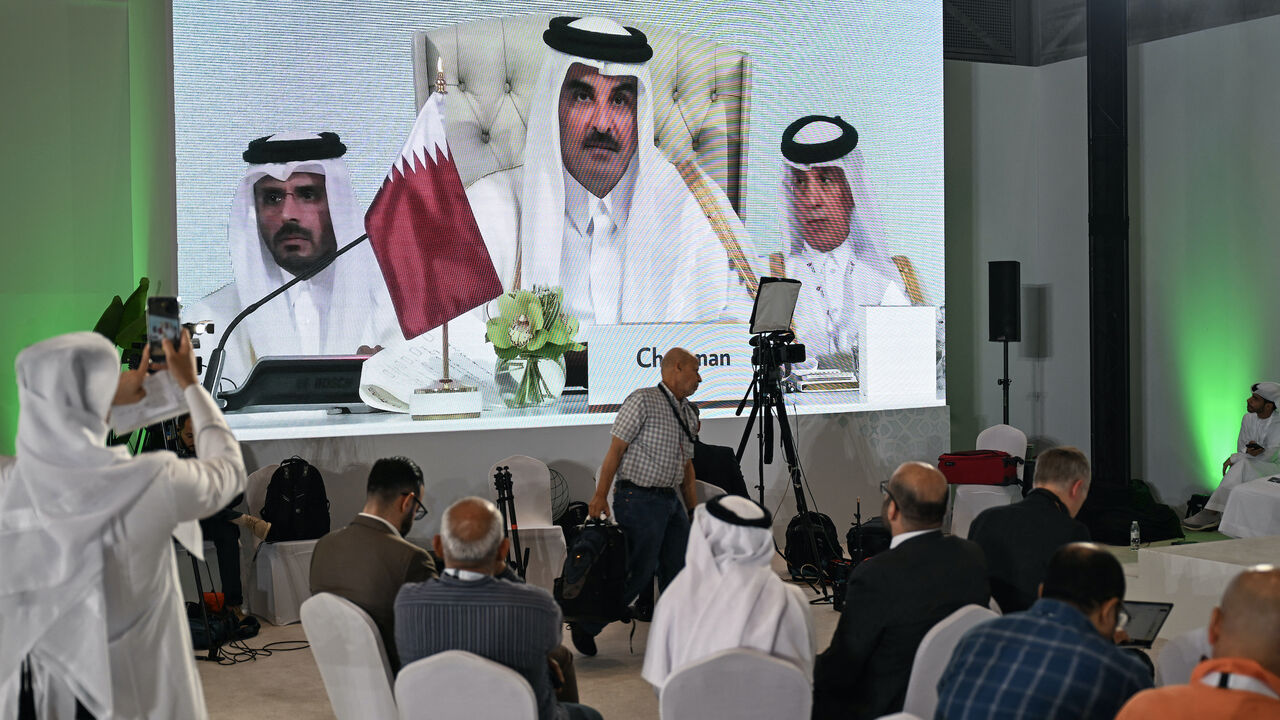
Dozens of Arab and Islamic leaders meeting in Qatar on Monday called on states to review relations with Israel, rallying behind Doha after Israeli strikes in the Qatari capital targeted Hamas leaders last week.
The final statement of the Arab League-Organization of Islamic Cooperation (OIC) emergency summit condemned “in the strongest terms the cowardly and illegal attack launched by Israel on Sept. 9, 2025, on a residential neighborhood in the Qatari capital, Doha,” calling it a “dangerous escalation that exposes the extremist hostility of the Israeli government.”
It accused Israel of creating “an unprecedented humanitarian crisis in Gaza” and rejected its attempts “to displace the Palestinian people from their territories.”
The statement urged “all states to take all possible legal and effective measures” against Israel, including sanctions, halting arms transfers, reviewing diplomatic and economic ties, and pursuing legal action.
القمة العربية الإسلامية الطارئة بالدوحة اليوم هي رسالة واضحة في وجه إرهاب الدولة الإسرائيلي بحق منطقتنا، وستسهم مخرجاتها بشكل فاعل في تكثيف عملنا المشترك وتنسيق مواقف وتدابير بلداننا، بما يوحد الكلمة والصف، مع شكرنا للأشقاء على تضامنهم مع دولة قطر وشعبها في هذا الهجوم الغادر. pic.twitter.com/0oa0EBpoWp
— تميم بن حمد (@TamimBinHamad) September 15, 2025
It also called on OIC members to review “the compatibility of Israel's membership in the United Nations with its Charter” and coordinate efforts “to suspend Israel's membership.”
Opening the summit earlier in the day, Qatar’s Emir Sheikh Tamim bin Hamad Al Thani denounced Israel’s “treacherous attack” on his country, saying, “Our citizens were shocked, and the entire world was stunned by the cowardly aggression and terrorist act.”
He questioned Israel’s commitment to ceasefire negotiations, noting that “Doha hosts delegations from Hamas and Israel, and our mediation has resulted in the release of Israeli hostages and Palestinian prisoners.” At the time of the strike, he said, “The Hamas leadership was studying an American proposal it received from us and Egypt.”
“If Israel wishes to assassinate leaders, why engage in negotiations?” Sheikh Tamim asked, warning that it was “difficult and impossible to negotiate with such a party.”
Qatar's mediation role in question
Monday’s summit followed a meeting in Doha on Sunday, where foreign ministers from the participating states drafted a joint statement and discussed concrete measures against Israel in response to its attack on Qatar.
Among the attendees at Monday’s summit were Saudi Crown Prince Mohammed bin Salman, UAE Vice President and Deputy Prime Minister Sheikh Mansour bin Zayed Al Nahyan, Egypt's President Abdel Fattah al-Sisi, Turkish President Recep Tayyip Erdogan, Jordan’s King Abdullah II, Lebanon’s President Joseph Aoun, Syria's President Ahmed al-Sharaa, Iran's President Masoud Pezeshkian, and Chairman of the Transitional Sovereignty Council of Sudan Abdel Fattah al-Burhan.
Israel carried out airstrikes last Tuesday targeting senior Hamas members who were discussing the latest US proposal on a Gaza ceasefire in Doha. Hamas claimed that the Israeli strikes failed to kill members of its negotiating delegation but confirmed that five people affiliated with the group were killed, including the son of Hamas’ exiled Gaza chief and top negotiator, Khalil al-Hayya.
A Qatari Internal Security Forces member was also killed, and several civilians were injured.
Qatar — along with Egypt and the United States — has been leading indirect talks between Hamas and Israel on a ceasefire deal since the Israeli war erupted in retaliation for Hamas’ Oct. 7, 2023, attack on Israel. During the cross-border assault, Hamas militants killed nearly 1,200 people and took over 250 others hostage. Meanwhile, in Gaza, nearly 65,000 Palestinians have been killed, around 1.9 million have been displaced, and more than half a million are on the brink of starvation.
The mediators managed to secure a brief seven-day truce in November 2023, during which Hamas released a total of 105 hostages and 240 Palestinian prisoners held in Israeli jails were freed. Another ceasefire was reached from Jan. 15 to March 18, which saw the release of 33 hostages, including eight bodies of deceased hostages.
Over the past two years, Israel has also launched strikes on Iran during a 12-day war last June, as well as against Iranian proxies in Lebanon, Syria and Yemen.
In June 2025, also in Qatar, Iran’s Islamic Revolutionary Guard Corps launched missile strikes on a major US military base in retaliation for US strikes that targeted three of its nuclear sites.
Strikes raise Gulf security concerns
Qatar has hosted Hamas’ political bureau since 2012, after the group’s former leader, Khaled Meshaal, relocated there from Syria.
The energy-rich Gulf nation is also a key US ally in the region and home to Al Udeid Air Base, the largest US military facility in the Middle East. The country has long played a mediating role in regional diplomacy, including facilitating talks between Israel and Hamas, as well as Washington and Afghanistan's Taliban.
For years, Washington’s support for Gulf nations had spared the region from the wars and conflicts that have torn through neighboring countries. But last week’s attack on Qatar appears to have shattered that sense of security and raised questions about the reliability of US guarantees.
US Secretary of State Marco Rubio, who was in Israel on Monday as Arab and Islamic leaders were meeting in Doha, called on Qatar to continue playing a role in resolving the Gaza conflict, while stopping short of criticizing the Israeli attack on Qatar.
“We are looking at what we can do with Qatar and what its next role will be in the talks. We encourage it to continue its role,” he told a joint press conference alongside Israeli Prime Minister Benjamin Netanyahu in Jerusalem.
For his part, Netanyahu renewed his threats against Hamas, saying, “The strike sent a clear message to Hamas leaders: You can try to run, but we will find you.”
Rubio is planning to travel to Qatar on Tuesday after his visit to Israel, The Washington Post reported, citing two American sources.
On Sunday, US President Donald Trump struck a more supportive tone.
“We’re with them. You know, they’ve been a great ally,” Trump told reporters at the White House. “Qatar has been a great ally, and they also lead a very difficult life because they’re right in the middle of everything.”

